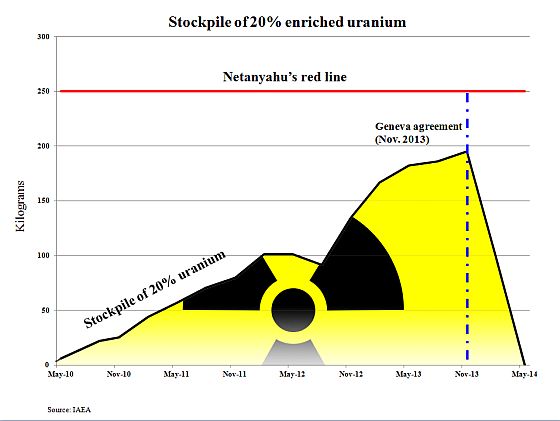Jonathan Freedland writes: There was no hesitation in pointing out the obvious loser from last weekend’s breakthrough deal between the world’s leading powers and Iran – and it wasn’t the scriptwriters of Homeland. True, the US drama has taken a blow: the current storyline centres on Tehran and its runaway nuclear programme, depicting a regime utterly beyond the reach of conventional diplomacy. Yet while Carrie and Saul plot and scheme, there’s secretary of state John Kerry shaking hands with his Iranian counterpart in Geneva – the actuality once again outdoing the talents of fiction, to paraphrase the great Philip Roth.
No, the obvious loser is Binyamin “Bibi” Netanyahu. His driving mission, the raison d’être of this, his second spell as Israel’s prime minister, has been the total removal of what he sees as Iran’s nuclear threat. To Bibi, Iran is the existential issue to which all other questions – including Israel’s relationship with its neighbours, the Palestinians – are secondary. For two decades he has warned that Tehran is within touching distance of acquiring nuclear weapons – in 1992, he gave it five years, max, before Tehran had the bomb – and he has been bent ever since on the total eradication of that danger, almost certainly by force.
But the Geneva deal does not guarantee total Iranian disarmament. The pact struck last week is interim and incomplete: Iran retains some limited ability to enrich uranium and the like. It is not an Iranian surrender. Which is why Netanyahu denounced the agreement as a “historic mistake”, making him a lone public voice against the international chorus of celebration and relief. (As it happens, the Saudis and the Gulf states also oppose the deal, which they think lets Iran, their great regional rival, off the hook: but only Bibi said so out loud.)
Bibi-watchers are focused now on how the Israeli leader will play the next six months, in which the Geneva agreement will either blossom into a lasting accord or break apart. But it prompts another question: what will be the impact on Israel’s conflict closer to home? Could the breakthrough with Iran somehow presage a breakthrough between Israelis and Palestinians?
The wisest bet would be on no. Peace talks are officially under way, Kerry having pushed both sides to the table in late July. What got Bibi there was, chiefly, Iran: participation in Kerry’s talks was the quid, US support for Israel on Iran the expected quo. But now that leverage has gone. Bibi no longer needs to make nice to Kerry or Barack Obama: as far as he’s concerned, they’ve betrayed him and he owes them nothing. One western diplomat sympathetic to Israel explains that no leader of that country will ever dare move in peace talks unless reassured that “the US president has his back”. Bibi, he says, has lost that confidence.
A similar dynamic could operate in reverse. Obama knows he has angered his Israeli ally and that might make him reluctant to do so a second time. The US president already has a job on his hands winning congressional blessing for the Geneva pact. Given the wide support Bibi enjoys on Capitol Hill, Obama will only make his task harder by demanding Israel concede to the Palestinians.
Add that Kerry’s “bandwidth” for the next six months will be consumed by closing the Iran deal, and that Israeli-Palestinian talks are said to be stalled anyway, and you can see why few expect a Geneva bounce. The safest wager would be on Bibi “managing” whatever pressure comes from Obama, going through the motions with the Palestinians and waiting for the US president to be a certified lame duck. Meanwhile, he’ll do what he can to undermine the accord with Iran.
But there’s another, riskier bet to make. It says that Obama now has momentum in the Middle East, using diplomacy to solve problems previously deemed soluble only through military action. [Continue reading…]

